Mac notebook and other portable computing is covered in The 'Book Review. iPad, iPod, iPhone, and
Apple TV news is covered in iOS News
Review. All prices are in US dollars unless otherwise noted.
News & Opinion
Software
News & Opinion
Microsoft Reports First Quarterly Loss
Market Day's Martha C. White reports:
"Microsoft, the once-dominant computer software giant that has seen
its fortunes wane in recent years, posted its first quarterly loss
since emerging as a public company in 1986 Thursday as it took a huge
charge for a failed acquisition.
"The Redmond, Wash.-based company reported a net loss of $492
million as its operating income was wiped out by a $6.2 billion
write-down related to its acquisition of advertising company
aQuantive in 2007." (aQuantive was an online advertising firm and
has become part of Microsoft Advertising.)
"The charge was an acknowledgment that the company's struggling
online services division is a significant financial drag on the
company, losing nearly $2 billion over the past year in addition to the
$6.2 billion write-down. Microsoft is still pouring money into
runner-up search engine Bing, but it only has a fraction of the market
share rival Google enjoys.
"'It brings into question Microsoft's ability to compete on the
advertising-driven web and suggests this is a market segment that is
beyond Microsoft, creating long-term doubts over Bing's future,' Rob
Enderle, principal analyst at the Enderle Group, said via email.
"In its news release announcing the results, Microsoft focused on
its record revenues of $73.7 billion for the fiscal year just ended and
$18 billion for the latest quarter, up 4 to 5 percent from year-earlier
levels. The growth was led by server tools, business products such as
Office, and entertainment and devices, which includes Xbox and the
recently acquired Skype."
Link:
Microsoft Reports First Quarterly Loss Ever
EPEAT Welcomes Apple Back
EPEAT CEO Robert Frisbee posted an open letter last Friday
expressing happiness at being able to announce that all of Apple's
previously registered products - and a number of new products - are
back on the EPEAT registry. (See last week's Mac
News Review for more on Apple's decision to leave EPEAT and its
open letter admitting its mistake and announcing its return to
EPEAT.)
"Our relationship with Apple is based on our natural alignment - as
Apple drives innovation in product design, EPEAT drives innovation in
standards design," Mr. Frisbee affirms. "EPEAT has pioneered voluntary
standards, after-market verification, optional criteria and tiered
product certification as ways to keep pace with a fast-paced
industry."
"We look forward to Apple's strong and creative thoughts on ongoing
standards development," he continues. "The outcome must reward new
directions for both design and sustainability, simultaneously
supporting the environment and the market for all manufacturers elegant
and high-performance products.
"An interesting question for EPEAT is how to reward innovations that
are not yet envisioned with standards that are fixed at a point in
time. Diverse goals, optional points awarded for innovations not yet
described, and flexibility within specified parameters to make this
happen are all on the table in EPEAT stakeholder discussions....
"Answers to these questions support all our subscribers, and lead to
mutual benefit for all our purchasers. And they led us to the path to
our strengthened relationship with Apple."
Link:
An Open Letter
Overnights Slated for July 24 at Apple Stores,
Mountain Lion on 25th?
 9 to 5 Mac's Seth Weintraub cites unofficial reports that Apple
Stores in the United States and elsewhere are planning overnights for
Tuesday, July 24th, with OS X 10.8 Mountain Lion to
launch the next morning
9 to 5 Mac's Seth Weintraub cites unofficial reports that Apple
Stores in the United States and elsewhere are planning overnights for
Tuesday, July 24th, with OS X 10.8 Mountain Lion to
launch the next morning
That sounds entirely plausible, since Apple has officially affirmed
that Mountain Lion will be released "in July," and there's only two
weeks of July left. Apple typically releases new products on Tuesdays,
of which there are just two left in the month - the 24th and 31st, and
waiting till the 31st would push the launch date into August
A Mountain Lion launch on July 24 would also be just over a year
after OS X 10.7 Lion's launch
on July 20, 2011.
Link: Apple Store
Overnights Happening July 24. Mountain Lion Launch the Next
Day?
How to Clean Install OS X Mountain Lion
It's All Tech says that with OS X Mountain Lion set to be released
later this month, many Mac users are beginning to plan their upgrade to
Apple's latest desktop operating system. When upgrading to Mountain
Lion, users will have two options: an upgrade over either OS X 10.6.8 Snow Leopard or Mac
OS X Lion, or a clean install.
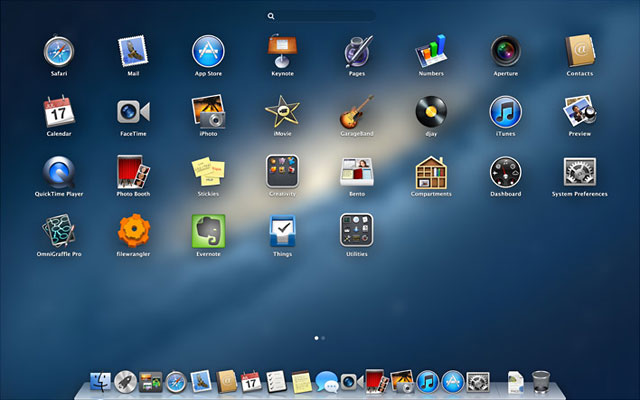 With OS X Mountain Lion to be
distributed only via the Mac App Store, the easiest method of upgrading
is to simply install it over your current OS, which will keep all of
your files, settings, and applications undisturbed.
With OS X Mountain Lion to be
distributed only via the Mac App Store, the easiest method of upgrading
is to simply install it over your current OS, which will keep all of
your files, settings, and applications undisturbed.
With a clean install you can erase your entire hard drive and start
afresh with OS X Mountain Lion, the process of so doing described in
this tutorial.
Publisher's note: Because new versions of software and operating
systems often have a few bugs, and because some software that works
with Lion may not be compatible with Mountain Lion or be buggy until
its is updated, we strongly recommend that you have a full bootable
backup of your current OS X 10.6 or 10.7 drive before installing
10.8 Mountain Lion. That way if there are any issues, you can easily
revert to the version you're using today. dk
Link: How to Clean
Install OS X Mountain Lion
Will Mountain Lion Be One of Apple's Last Desktop
Operating Systems?
Computerworld's Jonny Evans asks rhetorically, "Will Mountain Lion
be one of the last desktop operating systems Apple ships?"- suggesting
that in a sense it will be, because he's convinced that operating
systems are heading into the Cloud, and that in future your computer
(Mac or PC) will be more like an iPad, carrying a stripped-down onboard
OS in order to remain capable of doing some things offline but
dependent on the Cloud for accessing the bulk of information, software,
and services that will be online.
Evans acknowledges that Google's Chrome OS
is out in front of this wave, and that the wide use and acceptance of
online storage services like Dropbox
or Cortado confirm that this is
the direction computing is going, which is why in his estimation it's
Post-PC, and not
PC-Plus, as Microsoft claims.
Link: Will OS X Mountain
Lion Be One of the Last Desktop Operating Systems Apple Ships?
Forrest Gump's Apple Investment Would Have Made Him
a Billionaire
 UK based online retailer FancyDressCostumes.co.uk blogger
Martin Delaney has estimated what return the fictional Forrest Gump and
Dan Taylor ("Lieutenant Dan") would have yielded from their investment
in "some kind of fruit company" in 1994's Forrest Gump. The film is
based upon a novel of the same name authored by Winston Groom and
published in 1986.
UK based online retailer FancyDressCostumes.co.uk blogger
Martin Delaney has estimated what return the fictional Forrest Gump and
Dan Taylor ("Lieutenant Dan") would have yielded from their investment
in "some kind of fruit company" in 1994's Forrest Gump. The film is
based upon a novel of the same name authored by Winston Groom and
published in 1986.
You can view a short clip of the relevant scene from the film
on YouTube.
By combining publicly available information about Apple's history
and inputting realistic figures where accurate data is not available,
it is possible to track the duo's investment from inception all the way
to the present day.
Some data was excluded from the calculations, such as the
unspecified amount of equity that Forrest Gump sells within a couple of
years to pay for the renovation of his local church and construction of
a medical center.
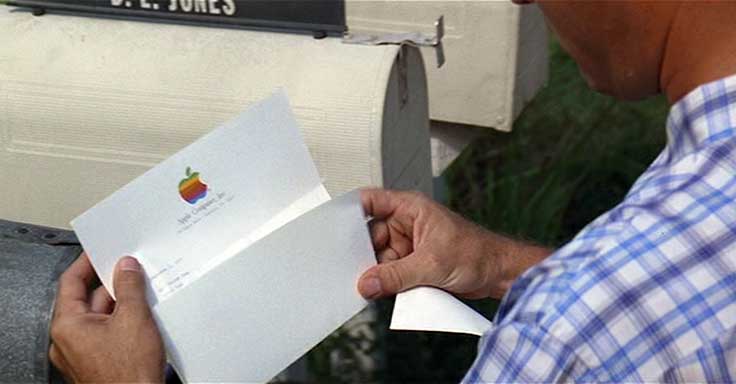 The profits from the Bubba Gump Shrimp
Company that Lt. Dan used to buy into Apple were calculated to be
$100,000, giving the duo a 3% share of the business in 1978.
The profits from the Bubba Gump Shrimp
Company that Lt. Dan used to buy into Apple were calculated to be
$100,000, giving the duo a 3% share of the business in 1978.
At the time of the book's publication in 1986, Mr. Gump and Lt.
Dan's interest in Apple would have been worth $49 million. In 1994,
just eight years later when the movie was released, their position
would have increased to $91 million.
Delaney notes that it was after Steve Jobs' returned as CEO in
1997 and the subsequent fifteen years where the colossal gains in
their investment would have started to take affect. Notably, as of July
2, 2012, Apple shares were trading at $591, thereby skyrocketing their
position to a valuation of $6.98 billion.
The fancy dress retailer is looking forward to seeing how Mr. Gump's
investment fares over the next decade with Tim Cook as CEO.
Link: What Forrest
Gump's Apple Investment Could Be Worth Today
Mac App Store 'for People Afraid of Using a
Computer'
The MacDrifter blog cites a tweet from Roustem Karimov of AgileBits
saying the latest 1Password update was rejected from the Mac App Store
(MAS) for sandboxing entitlements, and is available again as a direct
download purchase, observing that the Mac App Store is not for utility
apps or power users, and advising that apps like 1Password,
TextExpander and Keyboard Maestro should all be purchased directly from
the developers' sites.
"The MAS is for people afraid of using a computer," MacDrifter
continues. "I applaud Apple for taking the fear out of technology. I
also will not purchase my utilities from the MAS. Apple may be happy to
have the nerds along for the ride, but they are not their target
market. Normal people that just want to use a few apps and don't care
about tweaking their experience are Apple's new target
demographic."
Link: 1Password on the
Mac App Store
The Exceptional iMac G4
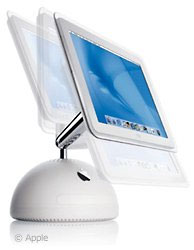
15" iMac G4
The iMac G4 -
your editor's favorite iMac model and one of Apple's most innovative
and brilliant desktop computer designs ever - is celebrating its 10th
anniversary this year, and the 17" version this week.
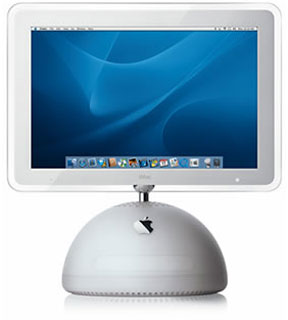
17" iMac G4
Macworld's Benj Edwards notes that with its innovative form factor,
the then new and advanced OS X 10.1 operating system, and a
then-unparalleled suite of integrated software, the iMac G4 led a new
generation of consumer-grade Apple desktops that contributed to the
company's newfound financial security during a time of transition that
also saw the iPod begin to establish market dominance.
Publisher's note: For more on the place of the iMac G4, see our
round table discussion from this past January, Happy 10th Birthday, 'Luxo Jr' iMac
G4! dk
Link: The Exceptional
iMac G4 Ten Years Later
Software
iFileX: Free Spotlight Alternative for OS X 10.4
and Later
PR: iFileX's functionality and design is based on Mac OS
early-era file search tools such as Find File and Sherlock, now
replaced by Spotlight. There been existing another search tool for
years, Find Any File, from which iFileX borrows some special features.
If you like iFileX, you're encouraged to try out Find Any File as well,
since the latter offers additional features not available in iFileX and
is also faster.
iFileX Features:
- Find files Spotlight doesn't.
- As a root user, Files inside packages, bundles, hidden files,
...
- Filter results
- Easy show or hide packages content, hidden files and/or folders,
show duplicates, ..
- Advanced Boolean operators
- Search after names, file sizes, creation and or modification dates,
Folders, Alias, ..
- No indexing
- Doesn't index files and doesn't depend on Spotlight.
- Very fast searching.
- Fast searching on HFS formatted volumes.
- OS X 10.8 Mountain Lion ready
- Enables "Put Back" feature, fullscreen support and Quicklook
support.
- Localized - English, German, Swedish, Dutch, Russian, Simple
Chinese, Ukraine, Greek, Spanish, Italian, and French.
How to Use iFileX
If you want to remove for example a application named MyApp.app -
you can enter "myapp" in the name field.
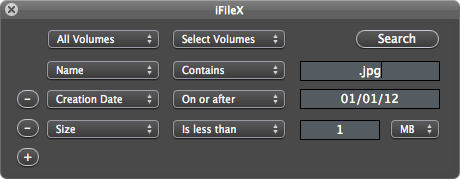 To
narrow down the search you can add a new query and set it to "Creation
Date" and set it to "Within last 1 hour" (Given you installed MyApp.app
less then 1 hour ago).
To
narrow down the search you can add a new query and set it to "Creation
Date" and set it to "Within last 1 hour" (Given you installed MyApp.app
less then 1 hour ago).
Then click on the search button. iFileX will then search for files
which include "myapp" in the filename and created within 1 hour.
When searching is finished, a new window will popup including all
found files.
Hints
- If you want to uninstall applications you can use any uninstaller
(as iTrash) but those tools not always find obscure files. With iFileX
you can locate them very easily. Use the query 'Creation date' and
'Within last .' for retrieving all possible related files created by
the application you try to remove.
- Many applications save hidden files at unusable locations of a
volume. You can easily reveal those by using the 'Only show hidden
files'.
- Always try to narrow down the search bandwidth by adding more
queries. Hence it is difficult to search the results when you have more
the 10000 found files.
iFileX is free.
Link: iFileX
Link: Find Any File
($6 shareware, requires OS X 10.4.1 or later;
$7.99 in the Mac App Store, requires OS X 10.4.4 or later)
MenuMeters: Free System Monitoring App for OS X
10.4 and Newer
PR: MenuMeters is a set of CPU, memory, disk, and network
monitoring tools for Mac OS X. Although there are numerous other
programs which do the same thing, most are windows that sit in a corner
or on the desktop, inevitably becoming obscured by document windows on
a laptop's small screen. Most monitors which use the menubar mostly use
the NSStatusItem API, which has the annoying tendency to totally
reorder your menubar on every login.
 The MenuMeters
monitors are true SystemUIServer plugins (also known as Menu Extras)
which means they can be reordered using command-drag and remember their
positions in the menubar across logins and restarts.
The MenuMeters
monitors are true SystemUIServer plugins (also known as Menu Extras)
which means they can be reordered using command-drag and remember their
positions in the menubar across logins and restarts.
MenuMeters Modules
The CPU Meter can display system load both as a total percentage, or
broken out as user and system time. It can also graph user and system
load and display the load as a "thermometer". The menu for the CPU
Meter contains several pieces of information handy to have a single
click away.
The Disk Activity Meter displays disk activity to local disks on the
system (anything that is a IOKit BlockStorage driver). It is hotplug
aware, and will show activity on FireWire and USB disks as they are
mounted. The Disk Meter menu shows volume space details for local
drives (it does not display mounted network volumes for performance
reasons).
The Memory Meter can display current memory usage as either a pie
chart, thermometer, history graph, or as used/free totals. The Memory
Meter menu shows a breakdown of current memory usage and VM statistics.
The Memory Meter can optionally display a paging indicator light.
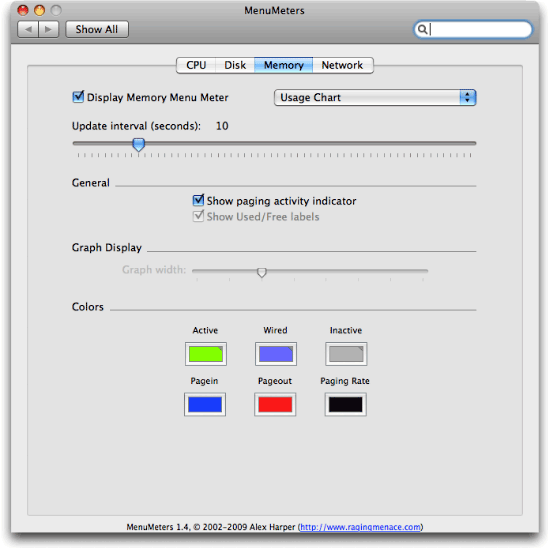
The Net Meter can display network throughput as arrows, bytes per
second, and/or as a graph. Both the arrows and the graph are scaled
using a user-selected scaling factor and calculation. Scaling can be
done on the basis of actual link speed reported by the network
interface or peak traffic and can use one of several scaling
calculations. The Net Meter menu shows current interfaces and their
status. Interface information is gathered from the SystemConfiguraton
framework and thus is Mac OS X network location aware (to prevent
interfaces from appearing in this menu see the FAQ).
MenuMeters comes without warranty or support, and is released under
the GNU General Public License (GPL). This makes it both "free" as in
beer and "free" as in speech, open source mostly because there isn't a
good reason for it not to be, but although distributed as open-source
freeware, a great deal of effort has gone into the creation and
maintenance of MenuMeters, so if you find it you're requested to please
consider showing your support by donating via PayPal.
System Requirements
- Mac OS X 10.4 or later (10.8 supported)
- PowerPC or Intel based Macintosh (Universal Binary)
Note: if you are installing over an older version of MenuMeters, you
must logout and login after installation in order to load the new
version.
Link: MenuMeters
TenFourFox 10.0.6 PowerPC Firefox Port
Released
PR: TenFourFox 10.0.6 is a PowerPC port of Firefox ESR 10
that brings most of the latter's feature set to older Macs. Version
10.0.6 is a security and bug fix update.
TenFourFox uses modified Firefox source code, rewritten to remain
compatible with Mac OS X 10.4 and PowerPC Macs. It also contains
specific optimizations and special features for PowerPC G3, G4, and G5
processors. For this reason, it is not exactly the same as Firefox.
However, it is intended to be as compatible with it as possible,
including most add-ons and most standard features. You can treat 10.4Fx
as equivalent with Firefox ESR 10.0 in most circumstances, with
specific exceptions noted below.
TenFourFox is available optimized for G3 processors, two variants of
G4 processors (7400/7450"G4e"), and G5 processors.
Note that TenFourFox no longer supports browser plugins, so if you
require Flash, Java, or other plugins, do not use TenFourFox. (Plugins
are not extensions - most add-ons and extensions will work. However,
add-ons that require an Intel Macintosh will not work with TenFourFox,
even if they are otherwise compatible with Firefox 10, and add-ons that
require OS X 10.5 Leopard may not be compatible with TenFourFox
running on Mac OS X 10.4 Tiger, even if they are compatible with
PowerPC.)
Starting with Firefox 10, Mozilla is offering an extended support
release version of Firefox ("Firefox ESR") intended for environments
where users are unable to use rapid-release versions of Firefox due to
policy or technical constraints. TenFourFox 10.x is based on this
extended support release and is intended for users who wish to remain
with a stable browser core. The stable branch will continue to receive
bugfixes and security updates, but will not receive new Firefox
features (although it may receive certain 10.4Fx-specific features
judged important for legacy users).
Plugins on PowerPC are of special concern, because Mozilla is making
updates to their plugin architecture which may require the plugins
themselves to be updated, and there are certain difficult-to-correct
bugs with them already on Tiger. Most importantly, QuickTime and Adobe
Flash for PowerPC are no longer maintained and have known security
risks that can crash, perform malicious operations or leak data, and
Flash 10.1 is rapidly becoming unsupported by many applications.
For Internet video, Floodgap software now recommend the use of
TenFourFox's optional QuickTimeEnabler.
This allows many videos to be handled in QuickTime Player directly.
Link: TenFourFox
Fetch 5.7.2 Released
PR: Fetch is a full-featured file transfer client for the
Apple Macintosh whose user interface emphasizes simplicity and ease of
use. Fetch supports FTP and SFTP, the most popular file transfer
protocols on the Internet for compatibility with thousands of Internet
service providers, web hosting companies, publishers, prepress
companies, and more:
Do you maintain a website? Move large files between computers? Have
you been told you need something called an FTP client? If you own a
Mac, you've come to the right place! Take the Fetch Tour, check out all
the features, and download a free trial copy of Fetch to check it out
for yourself.
Features
Support for FTP, SFTP, and FTP with TLS/SSL (FTPS)
Droplet shortcuts for easy uploading Synchronize folders using the
Mirror command Support for drag-and-drop of files and folders between
servers and your Mac, or between two servers Automatic resume of
stalled or failed uploads and downloads Quick Look support for
previewing files on servers Edit any kind of file and the changes will
automatically be saved back to the server Compatibility with virtually
all FTP servers, including VMS, VM/CMS, OS/2, Chyron, and more
New in Fetch 5.7
Support for syncing shortcuts between Macs using
Dropbox or a shared file server Support for viewing the overall
progress and time remaining of multi-file transfers Find field for
filtering the file list to show only the files you want Support for
preserving the modification dates of uploaded files
Fetch 5.7 includes a number of features aimed at improving your
ability to protect the privacy of your data.
Uploading Files to your web server is as simple as clicking the Put
button, or dragging the files icon from the Finder. WebView lets you
set up a correspondence between files in Fetch and the address of the
webpage they are part of, so that you can easily view changes to your
website in a web browser by selecting files and clicking Fetch's
WebView button. The Mirror command lets you quickly upload all the
changed files in a folder, efficiently keeping your website up to date.
The Fetch File Management system works just like the Mac OS X Finder,
so you can rename files by typing Return, move files by dragging them
onto folders, and delete them by clicking the Delete button. Account
Management with Fetch is easy. The Get Info command lets you total the
size of all the files in your account, so that you can manage your
usage of disk space, and also lets you keep directories private, or
make CGI scripts executable, with a user interface that translates
cryptic Unix permission codes to plain English and back.
System requirements: Mac OS X 10.5 through 10.8
Fetch 5 sells for $28.99
Link:
Fetch
Desktop Mac
Deals
Low End Mac updates the following price trackers monthly:
For deals on current and discontinued 'Books, see our 13" MacBook and MacBook Pro,
MacBook Air, 13" MacBook Pro, 15" MacBook Pro, 17" MacBook Pro, 12" PowerBook G4, 15" PowerBook G4, 17" PowerBook G4, titanium PowerBook G4,
iBook G4, PowerBook G3, and iBook G3 deals.
We also track iPad,
iPhone, iPod touch, iPod classic, iPod nano, and iPod shuffle deals.

 9 to 5 Mac's Seth Weintraub cites unofficial reports that Apple
Stores in the United States and elsewhere are planning overnights for
Tuesday, July 24th, with
9 to 5 Mac's Seth Weintraub cites unofficial reports that Apple
Stores in the United States and elsewhere are planning overnights for
Tuesday, July 24th, with  With OS X Mountain Lion to be
distributed only via the Mac App Store, the easiest method of upgrading
is to simply install it over your current OS, which will keep all of
your files, settings, and applications undisturbed.
With OS X Mountain Lion to be
distributed only via the Mac App Store, the easiest method of upgrading
is to simply install it over your current OS, which will keep all of
your files, settings, and applications undisturbed. UK based online retailer FancyDressCostumes.co.uk blogger
Martin Delaney has estimated what return the fictional Forrest Gump and
Dan Taylor ("Lieutenant Dan") would have yielded from their investment
in "some kind of fruit company" in 1994's Forrest Gump. The film is
based upon a novel of the same name authored by Winston Groom and
published in 1986.
UK based online retailer FancyDressCostumes.co.uk blogger
Martin Delaney has estimated what return the fictional Forrest Gump and
Dan Taylor ("Lieutenant Dan") would have yielded from their investment
in "some kind of fruit company" in 1994's Forrest Gump. The film is
based upon a novel of the same name authored by Winston Groom and
published in 1986. The profits from the Bubba Gump Shrimp
Company that Lt. Dan used to buy into Apple were calculated to be
$100,000, giving the duo a 3% share of the business in 1978.
The profits from the Bubba Gump Shrimp
Company that Lt. Dan used to buy into Apple were calculated to be
$100,000, giving the duo a 3% share of the business in 1978.

 To
narrow down the search you can add a new query and set it to "Creation
Date" and set it to "Within last 1 hour" (Given you installed MyApp.app
less then 1 hour ago).
To
narrow down the search you can add a new query and set it to "Creation
Date" and set it to "Within last 1 hour" (Given you installed MyApp.app
less then 1 hour ago).

